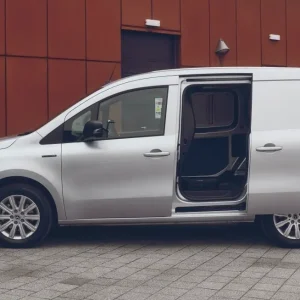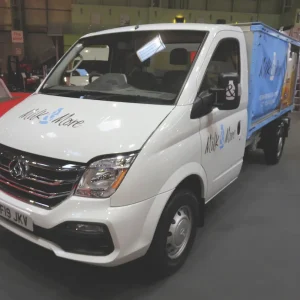Figures from the Society of Motor Manufacturers and Traders in July revealed that 133,177 vans were registered between January to June 2013. This represented an 11.2% increase from the same period in 2012, and a helped towards a 2.6% rise in the rolling year figure (253,032).
Sales-wise, however, it is a slightly different story, with a 3.8% reverse in LCV purchases being reported for May. The van rental market has benefitted from the resistance of operators to invest in vehicles outright, and is responding to their needs by offering different packages to what used to be available, and making sure that their customer’s needs are met.
Danny Glynn, head of Flex-E-Rent at Enterprise Rent-A-Car maintains that one of the big issues for customers remains operating costs. “Vehicle downtime is one of the biggest areas of concern for businesses that hire vans,” he says. “This is why so many operators are looking for rental suppliers that have truly national coverage – both for quickly accessing rental vans from branches, and also, in the case of long-term rentals, to ensure that the vehicles can be quickly and locally serviced.”
Nicky Simpson, head of fleet solutions, SHB, shares Glynn’s views on the desire for increased efficiency, and also highlights a growing awareness of safety systems amongst her customers. “I think previously users might have been a bit lapse in what the requirements were, and what they needed to comply with when it came to health and safety, as well the overall level of safety options in a vehicle,” she comments. “With the introduction of Van Excellence, this view may have changed for some.
“With our vehicles, the smaller renter might take standard vehicles, but even those vans offer impressive specification nowadays,” continues Simpson. “People want items such as speed limiters, reversing aids, more safety steps, so one of the demands being placed on us, as vehicle providers, is the ability to offer this level of equipment as standard.”
On the leasing side of the market, Mark Lovett, head of commercial vehicles at Leaseplan UK, says that customers are looking for particular brands with packages that can help them cut the costs of fuel and downtime. “To some extent this makes our job easier because you have a clear understanding of what the customer or prospect’s operational needs are, and we can properly qualify what they require from a commercial vehicle leasing provider,” he believes.
“Van operators are looking to carry more on their vehicles, which means there is an increasing requirement for a vehicle that is lighter, but affords a heavier payload,” continues Lovett. “People are looking for more green credentials in a vehicle, which tends to mean lower emissions and higher fuel economy.” In terms of model segments in the rental market, statistics show that while large panel vans up to 3.5-tonnes are being considered more carefully, there is still a high level of demand for smaller vehicles, says Lovett.
While it offers a number of specialist vehicles, SHB is seeing more and more customers shy away from these, in favour of traditional vans. “There has always been an issue around costs of 4x4s; they are expensive to run, which doesn’t help when there are tight budgetary controls within a company. A lot of customers now tend to use panel vans, which can be as practical, and are certainly more cost-effective.”
Flexible friends
Northgate talked about the possibility of a more flexible approach to vehicle hire back in 2011, and it seems that other rental van providers have got involved in an initiative that is proving popular with customers. SHB is one of those companies that has seen a shift in the mindset of renters. “Running a high-spec van used to mean being locked into a long-term contract, but these days, the customers don’t want that, they want more flexibility to choose between vehicles,” says Simpson. “If they do have long-term work contracts, they tend to have get-out clauses with their customers, so they want to have the same setup with us. Also because many businesses don’t have much capital available, they would rather go with flexi-hire than a longer-term agreement.
“Our customers typically want vehicles over a shorter period – i.e. they want younger vehicles – so the expectation on us as a rental company is to make sure we’ve got vehicles that are no more than two to three years old. This means they are vehicles that have technologies such as stop-start, and cleaner and more efficient engines.”
Meanwhile Enterprise set up Flex-E-Rent to “enable customers to on- and off-hire vehicles to suit their own business needs”, comments Glynn. “This flexibility has been key to its success – fleets can take on vehicles for long-term periods, even a year or two, without having to commit to purchasing their own. We also offer a ‘Month or More’ long-term rental product. It’s designed to allow our customers to benefit from competitive rates where there is no bespoke equipment required on the vehicles or they are needed for a medium time period.”
And the Enterprise man assures that the level of equipment available is not affected by the type of contract that the customers are looking for. “Organisations need specialist equipment of all shapes and sizes, so Enterprise Flex-E-Rent has the facilities to fit virtually anything to vans, ensuring they’re completely fit for purpose. These needs can range from basic tow bars, shelving and beacons to specialist heavy equipment, customer livery, Bluetooth and telematics.
“We can bundle the additional costs of this equipment into the weekly hire costs, which enables our customers to manage their cash flow,” adds Glynn. “It could either be as an upfront payment, spread over the first twelve months of hire or over the whole life of the vehicle. It depends what best suits the needs of the business.”
Predictably, Glynn believes that this approach to rental will remain strong in the future rental market. “Rental offers a level of flexibility and agility that’s very much in demand right now, and is likely
to remain so for quite a while,” he predicts. “There is still uncertainty in the supply chain within the UK, and operators are looking for the most cost-effective way to react to the day-to-day demands of their business.”
Future of van rental
The experts predict that the current trends will continue, which puts the emphasis on the rental companies to invest in high-specification products, reckons Simpson. “People are now more aware of legislation, what they can and can’t carry, and loading restrictions,” she says. “There is a much greater level of service expectation from the customer. Historically we have just provided the vehicle, but now we are expected to provide more model specific information, KPIs, and online support. The growth in flexible rental will continue as people work in new accounting legislation to combat having to use high level of capital, or having to put things on balance sheets. That growth of flexible, long-term rental will continue.”
In the leasing market, Lovett believes there will be more emphasis on the individual, rather than the vehicle, in some areas. “We are seeing more growth in
the area of driver training for LCVs, particularly because there are many van drivers that go from passenger cars to a fully laden 3.5-tonne van, which handles very differently, not to mention has very different dimensions.”
The need for greater uptime, and one-stop shop conversions will continue, believes Lovett, who hints at greater interest in the alternative vehicle market. “I think there will be a requirement to discuss whether electric vans will become more relevant in the future. I think the van market will drive the development more than passenger cars – electric vans make more sense that private use.





